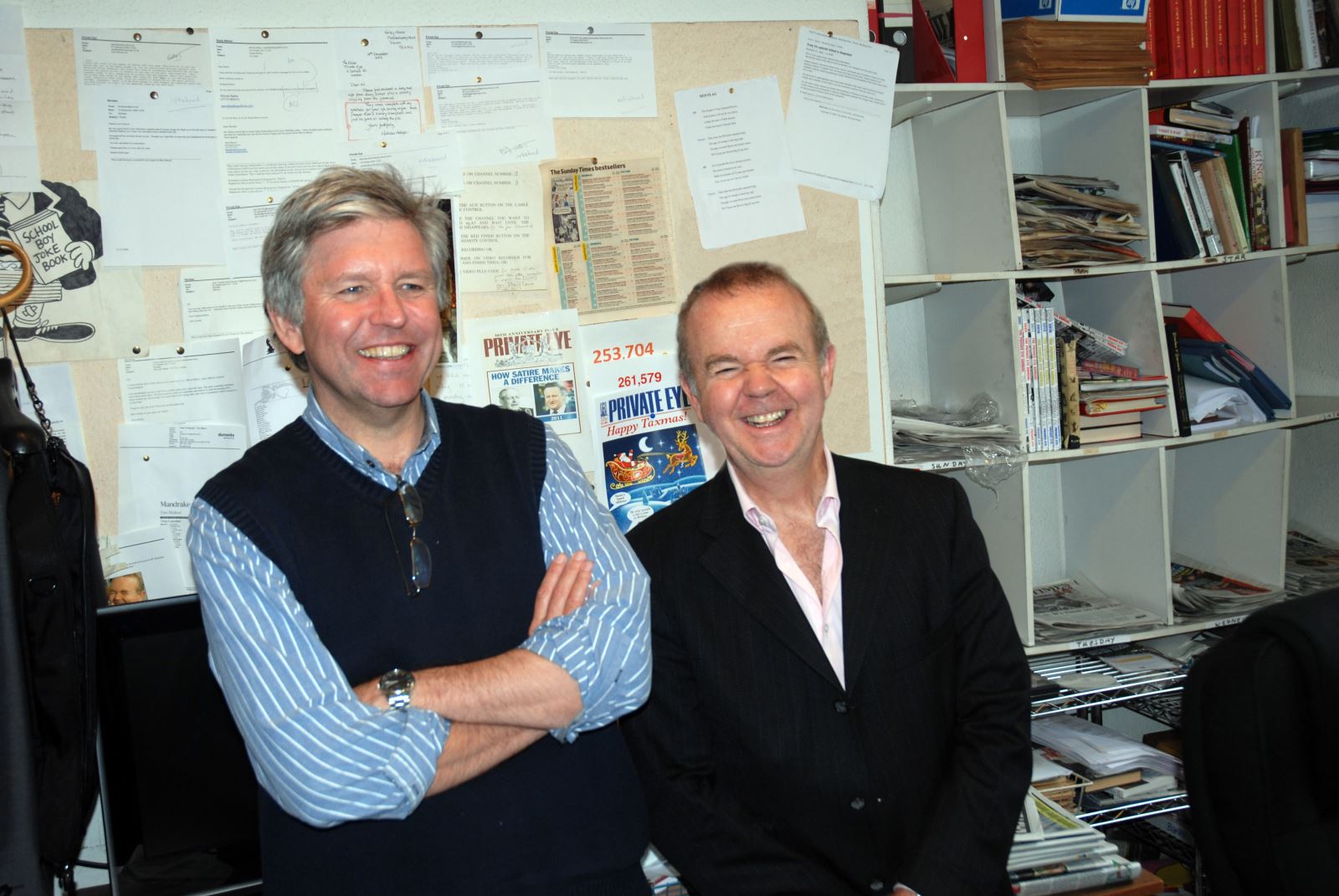
Have we got some great news for you
Talented SPIKE co-writers Ian Hislop and Nick Newman will be live at Blackpool Grand Theatre for a special post-show Q&A on the opening night of the all-star Spike Milligan comedy this November.
Join Ian Hislop (BBC’s Have I Got News For You team captain and editor of Private Eye) and Nick Newman (writer and satirical cartoonist) after the first performance of the critically-acclaimed show on Tuesday 15 November for an extra special Question and Answer session. It’s good to be alive!
Radio sensations The Goons are back at Blackpool Grand from Tuesday 15 to Saturday 19 November! Robert Wilfort (Gavin and Stacey, Bridgerton) will play the infamous Spike Milligan, Patrick Warner (The Crown, One Man, Two Guvnors) is Peter Sellers and Jeremy Lloyd (The Comedy About a Bank Robbery, Trial by Laughter) is Harry Secombe in the absurdly funny new play SPIKE about the life and career of the inimitable comedy genius Spike Milligan. Top TV comedienne and podcaster Margaret Cabourn-Smith (Motherland, Miranda, Buffering) will also join the famous Eccles, Count Jim Moriarty and Bluebottle to reprise her role as Janet the irrepressible sound assistant.
Renowned writers Ian Hislop and Nick Newman talked to Brian Logan about SPIKE before the excitingly anarchic production crashes into The Grand this November:
How did the play come about?
Nick Newman [NN]: We wanted to write something about Spike to coincide with the centenary of his birth – we didn’t quite hit that deadline, but we made it for his 104th! From the outset, we wanted it to be a celebration. There are too many biopics of comedians that tell the ‘tears of a clown’ story. And while you can’t escape Spike’s mental health issues, for us that was something that we saw as powering his comedy.
Ian Hislop [IH]: We didn’t want an audience coming out thinking, ‘the really important thing about this person is that they were miserable and unhappy. And now so am I!’. We wanted them thinking, ‘the important thing about this person is that he produced all this!’ and it made a huge number of people very happy. And still does. There are two very grim incidents in the play involving Spike having breakdowns, both of which he immediately turned into comedy. That in itself is fascinating.
Did you want to celebrate Spike because you were Goon Show fans when you were younger?
NN: Maybe. I remember when I was at school, just crying with laughter reading Spike’s war memoirs. And The Goon Show, I was brought up on it. My father was in the RAF and we were stationed in places like Singapore where there was no television. All we had to listen to was acetate recordings of The Goon Show. I can still quote chunks and bore for Britain.
IH: I’m a lot younger than Nick, so I didn’t hear them first time around. I missed out. The pleasure for me of making this play was Nick saying, ‘this is really funny. Genuinely funny and brilliant writing.’ And I went back and listened to it and was gob smacked. I’d become so used to the older Spike, and the older Harry Secombe and Peter Sellers, that I’d forgotten that when they first came along, they’d just been demobbed, they were really young men, and they blew the place away. And the people in charge at the BBC couldn’t bear it. They had no idea what this group were doing, and they wanted to shut them down, basically. They thought they were noisy and anarchic and up to no good. All of which was true: that’s what made them so attractive. So, for me the challenge with the play was: can we bring all that to life onstage?
And that's what the play depicts: the battles between Milligan and the BBC?
NN: When we first began writing, we managed to get hold of a great cache of correspondence between Spike and the BBC, and from BBC management about Spike. And that gave us the backbone of the story. Because it was quite clear that Spike, having been fighting Hitler and Mussolini for five years, went into the BBC and started fighting them. It was a continuation of war by other means.
Some of it was class warfare, I think, because Spike was working-class. As you can tell from his war memoirs, he didn’t have time for the officer class. And of course, after the war, all these officers went straight into the BBC and ran it. So Spike was at loggerheads with them on that basis. As we’ve tried to reflect in the play, the BBC management were always saying: there’s too much in The Goon Show about the war, it’s too noisy, there are too many explosions. And this was Spike exorcising his demons. One critic described the Goons as being “like shell-shock on radio”, and that says it all. That was Spike’s experience: he was shell-shocked. And he carried on reflecting that in his work.
IH: It’s interesting, because we tend to think of the 1950s as being incredibly deferential and then luckily along came satire in 1961 and everything changed. But that’s not how it happened. The great satirists Richard Ingrams and Peter Cook were huge Spike fans. When I took over as editor of Private Eye, [previous editor] Ingrams said to me ‘Spike Milligan will write in letters. Just put them in! He’s a genius.’ And Michael Palin, who we worked with on our film The Wipers Times, said to us, ‘People say Monty Python was very influenced by The Goons. And yes: it was!’
It’s remarkable that Spike’s work inspired two different strands of UK comedy: Python-style absurdism but also the ’60s satire boom
IH: I don’t think they saw those things as separate in the way later historians did. Spike was just doing topical comedy. In 1954, the BBC produced a landmark TV version of George Orwell’s ‘1984’. The Goon Show almost immediately produced an episode called ‘1985’, taking the mickey out of the ‘Big Brother Corporation’.
NN: In the play, we show how satirical Spike was. There were conflicts with the BBC about Peter Sellers doing an impression of the Queen. The BBC hauled Spike in and said: ‘you can’t parody the Queen!’ Nobody had done that before: a direct satire of the monarchy. The BBC thought everyone was going to get put in the Tower. But then three years later, Prince Philip invited the Goons to be his representatives in the Cambridge tiddlywinks competition.
IH: Prince Philip clearly thought the Goons had delivered a very amusing representation of his wife. Which endeared him to me.
Did doing it live, in a theatre, help you get closer to the spirit of the Goons' work?
IH: When you put something onto the live stage, you can bridge the gap to the audience and have real fun with it...
NN: …because when they recorded it, they were endlessly ‘corpsing’- laughing uncontrollably and breaking the fourth wall. The BBC got so annoyed. They said, ‘you sound as if you’re having more fun than the audience.’ And they said: 'We are!' We’ve tried to reflect that on stage by also breaking the fourth wall. When you see the play performed live it does remind you that Spike always had an imaginary audience in his head.
IH: He was never happier than with an audience. Being a tortured writer on his own, that was the downside. For Spike, the great bit was rehearsal and then performance. Or the TV chat shows, on which he was such a great performer. Spike would be on anything. He just loved it. We needed an actor who would understand that, who really wanted to get the laughs.
NN: There is a responsibility to try and get it right. Because the Milligan family came to see the play, their reaction was very important to us. Jane Milligan came up to us after the show and said: ‘That was my dad on stage!’ That felt fantastic. Because the family want Spike’s legacy to be that he was very, very funny. And so do we. We have a lovely speech at the end of the play, a little paean of praise from Harry Secombe to what it was like working on the Goon Shows. Every time I hear it performed; it brings tears to my eyes. Because it’s exactly what my memory of the Goons is. Just wishing every day was a Sunday. Soaring on the thermal gusts of Spike Milligan’s imagination. Reflecting that is everything we wanted to achieve with the play.
Is it part of your ambition with the play to introduce Spike’s work to new audiences?
IH: Yes, I think that’s fair. There’s nothing quite as much fun as hearing a joke delivered to a modern audience that was written 100 years ago, in the case of The Wipers Times, or with the Goons, 50 years ago. And hearing today’s audience roar with laughter. You just think - that’s fabulous. That is incredibly pleasing.
Ian and Nick will have much more to say following the opening night of SPIKE at The Grand!
Relive the weird and wonderful time of The Goons once more and delve into the inner workings of one of our most unique and brilliantly irreverent comedy minds in this must-see show! Will Spike’s dogged obsession with finding the funny elevate The Goons to soaring new heights, or will the whole thing come crashing down with the stroke of a potato peeler? Book your seats now to find out!
SPIKE follows the recent successes of Ian Hislop and Nick Newman’s smash-hit plays A Bunch of Amateurs, The Wipers Times and Trial by Laughter. Extracts from The Goons used with the kind permission of Spike Milligan Productions.
Ian Hislop and Nick Newman’s SPIKE is at Blackpool Grand Theatre from Tuesday 15 to Saturday 19 November starring Robert Wilfort (Gavin and Stacey, Bridgerton), Patrick Warner (The Crown, One Man, Two Guvnors), Jeremy Lloyd (The Comedy About a Bank Robbery, Trial by Laughter) and TV comedienne and podcaster Margaret Cabourn-Smith. It’s not to be missed!
For all ticket and booking details visit here. Tickets starting from £17.50, concessions and member discounts available.
*Post show Q&A with Ian Hislop and Nick Newman on Tuesday 15 November only.
Contains strong language, references to suicide, loud bangs, strobe lighting and the use of prop cigarettes and guns on stage. Recommended 10yrs+
Related
Comments
Nobody has commented on this post yet, why not send us your thoughts and be the first?
 to add an item to your Itinerary basket.
to add an item to your Itinerary basket.









